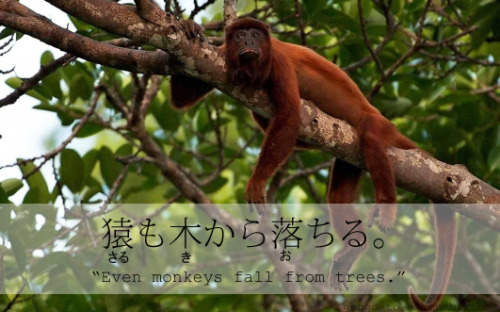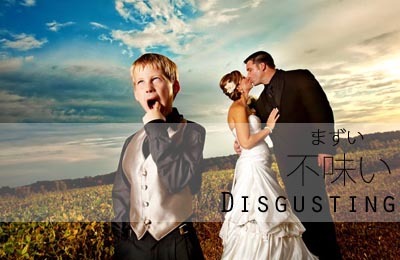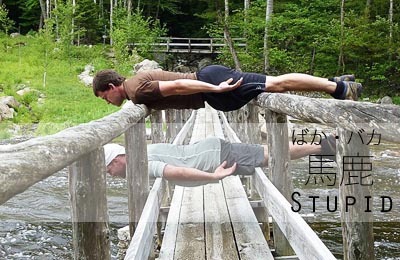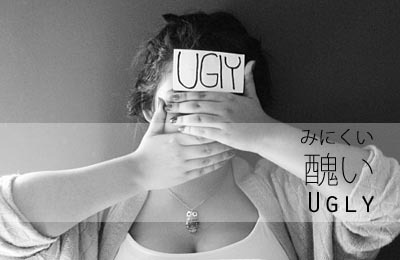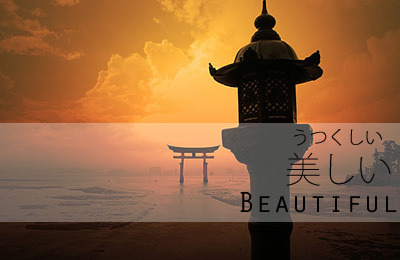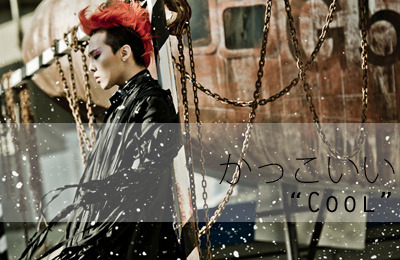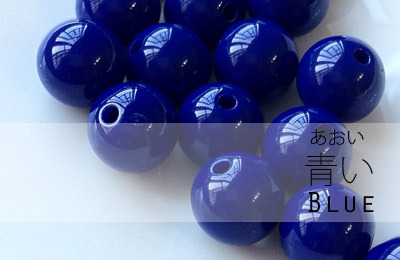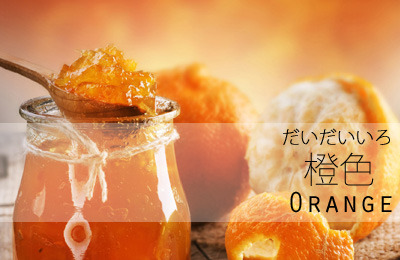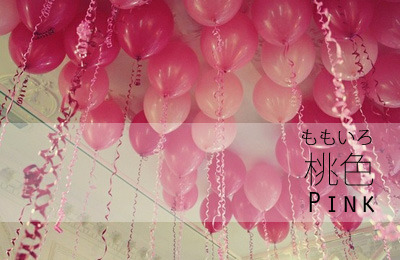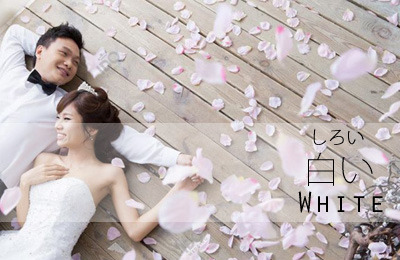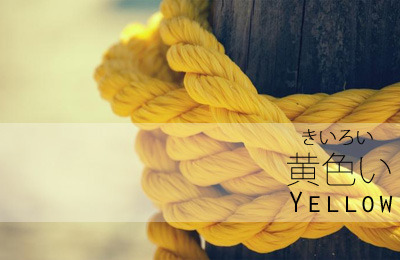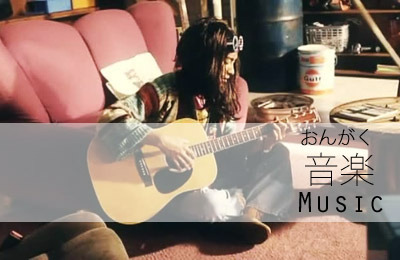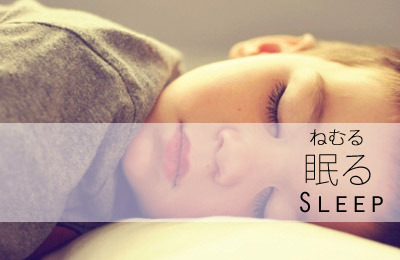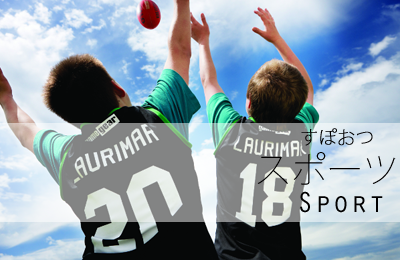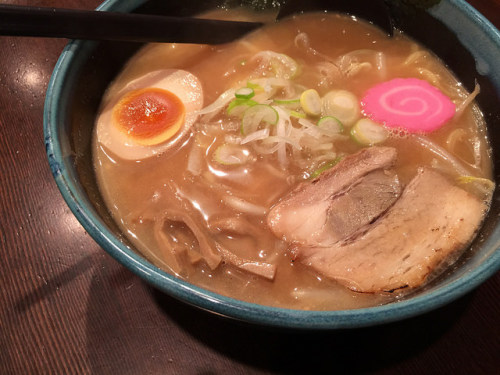#にほん
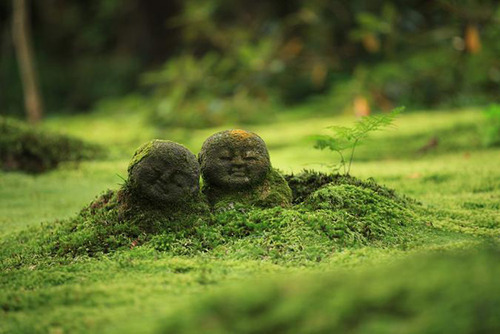
“n – a Buddist guardian of children and travellers or statues of him. Usually in the form of じぞうさま. These statues are found in temples and all over Japan at roadside or on paths.” – Oxford Japanese Minidictoinary, © Jonathan Bunt 2000, 2001, pg 103.
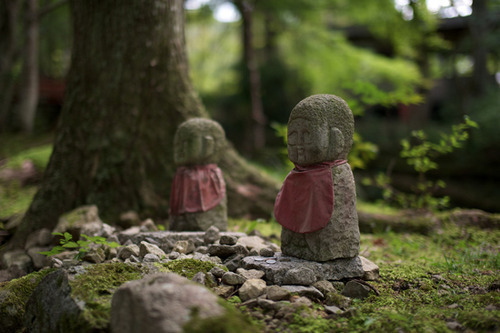
The Jizo / Ojizousama is one of Japans most loved Japanese divinities, as he is affiliated with protection and the saving of “lost” souls. More commonly the souls of children who have passed before ‘their time’. It is said that Ojizousama helps babies, still borns and children’s souls to pass onto the afterlife, saving them from an eternity of piling stones on the banks of the Sanzu River (a river which is believed to have to be crossed in order to reach the afterlife). In doing so he hides the young souls in his cloak, protecting them from demons and carrying them across.
It is quite common to find these statues in cemeteries, temples and on roadsides/paths and sometimes accompanied with little stones, pebbles and/or coins. These little offerings are given as thanks for saving/protecting someone or in hopes that this divinity with aid someone lost.
Ojizousama is also believed to be the protector of travellers, or dousojin, and Firefighters.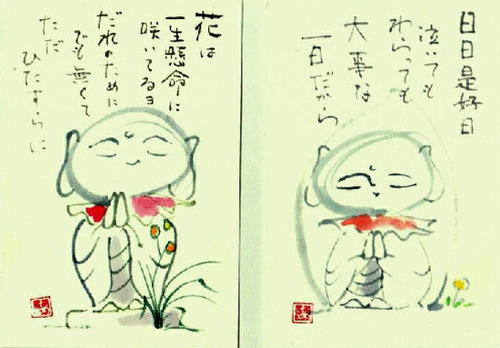
Negative Adjectives:
__________
Disgusting: Mazui / まずい / 不味い - (i-adj) also ‘unpleasant’; refers to taste, appearance and situation.
Stupid: Baka / ばか・バカ / 馬鹿 - (na-adj) also ‘idiot’, ‘jerk’, ‘folly’, ‘dunce’, etc. Used as an insult (vulgar language) or when describing something idiotic.
Ugly: Minikui / みにくし / 醜い - (i-adj) also ‘unattractive’.
Annoying: Wazurawashii / わずらわしい / 煩わしい - (i-adj) also ‘troublesome’.
Post link
Positive Adjectives:
Beautiful: Utsukushii / うつくしい / 美しい - (i-adj) refers to a person or place. Subarashii () used when refering to the day or weather.
Cool: Kakkoii / かっこいい / - (i-adj) also ‘good-looking’, ‘handsom’; male form of ‘kawaii’.
Cute: Kawaii / かわいい / 可愛い - (i-adj) also ‘adorable’; very effeminate term.
Dear: Itoshii / いとしい / 愛しい - (i-adj) also ‘lovely’, ‘beloved’, etc.
Post link
Colours (Colors) - 色(いろ)
____________________________________
Black: Kuro-i/ くろい/ 黒い
Blue: Ao-i/ あおい/ 青い
Brown: Chairo/ ちゃいろ/ 茶色
Green: Midori/ みどり/ 緑
Orange: Daidaiiro/ だいだいいろ/ 橙色
Pink: Momoiro/ ももいろ/ 桃色
Purple: Murasaki/ むらさき/ 紫
Red: Aka-i/ あかい/ 赤い
White: Shiro-i/ しろい/ 白い
Yellow: Kiiro-i/ きいろい/ 黄色い
Note:
When using colours as adjectives you will notice some end in ‘i’ and others don’t. In Japanese there are two ways which colours become adjectives 'i’ and 'no’.
1)’い’Adjectives are used as follows:
赤い車/Akai kuruma/Red car
青い車/Aoi kuruma/ Blue car
白い車/Shiroi kuruma / White car
黒い車/Kuroi kuruma/ Black car
(To form a noun, simply remove the 'i’. E.g. Akai, becomes Aka)
2)’の’Adjectives are used as follows:
紫の傘/Murasaki no kasa / Purple umbrella.
緑の傘/Midori no kasa / Green umbrella.
Or add 'いろ’ onto the end of both 'midori’ and 'murasaki’ to form ____いろ の かさ.
橙色の傘/Daidaiiro no kasa / Orange umbrella.
桃色の傘/Momoiro no kasa / Pink umbrella.
3)The following can appear as either a 'い’ or 'の’ adjective.
黄色(い/の)ペン/Kiiro-i/no pen / Yellow pen.
茶色(い/の)ペン/Chairo-i/no pen / Brown pen.
Post link
Likes & Hobbies
_______________________________________
Movie: Eiga / えいが / 映画 Music:
Ongaku: / おんがく / 音楽
Party: Paatei / ぱあてい / パーテイ
Photography: Shashinsatsuei / しゃしんさつえい / 写真撮影
Read: Yomi / よみ / 読み - or Yomu / 読む ([verb] to read)
Shopping: Kaimono / かいもの / 買い物 (買物) - or Kaimono suru / 買い物 する ([suru-verb] to shop)
Sleep: Nemuru / ねむる / 眠る [noun / ru verb]
Sport: Supootsu / すぽおつ / スポーツ
Post link
JLPT N1 Grammar - かたがた
Are you using it right??
でも seems like a great way to say “but” BUT… there’s a big but. There are politer (and more native-sounding) ways to say BUT. Learn about all the buts on this episode of Bunpogo!
————-
Welcome to Benkyogo!
In our ぶんぽうご Real Japanese Grammar series, Nani and Mani are deep diving into the textbook grammar required for the JLPT, throwing out the stuff you’ll never use, and teaching you how to speak authentically whilst expressing your own personality.
⭕️ You WILL:
- Understand grammar in real life context- Be told when and where to forget the BS - Get to listen to 2 random people free-talking about Japanese grammar
❌ You WON’T:
- Sound boring when talking to your Japanese friends - Say anything rude to your Japanese boss - Speak like you’re fresh outta your favourite anime
We don’t claim to be experts, we’re just 2 Japanese speakers (one native, one second language) chatting about the DO’s and DON’T’s of Japanese grammar in the 21st century. Keep up, textbooks!!
————-
Check out https://benkyogo.co.uk/ for detailed hints, tips and resources to self-study Japanese.
⛩Check out our store at https://www.etsy.com/shop/benkyogo
JLPT N2 Grammar - いわゆる
Are you using it right??
This one’s hard to say but once you get the knack it’s a surefire way to demonstrate your Japanese is higher level.
————-
Welcome to Benkyogo!
In our ぶんぽうご Real Japanese Grammar series, Nani and Mani are deep diving into the textbook grammar required for the JLPT, throwing out the stuff you’ll never use, and teaching you how to speak authentically whilst expressing your own personality.
⭕️ You WILL:
- Understand grammar in real life context- Be told when and where to forget the BS - Get to listen to 2 random people free-talking about Japanese grammar
❌ You WON’T:
- Sound boring when talking to your Japanese friends - Say anything rude to your Japanese boss - Speak like you’re fresh outta your favourite anime
We don’t claim to be experts, we’re just 2 Japanese speakers (one native, one second language) chatting about the DO’s and DON’T’s of Japanese grammar in the 21st century. Keep up, textbooks!!
————-
Check out https://benkyogo.co.uk/for detailed hints, tips and resources to self-study Japanese.
⛩Check out our store at https://www.etsy.com/shop/benkyogo
JLPT N3 Grammar - きる
Are you using it right??
でも seems like a great way to say “but” BUT… there’s a big but. There are politer (and more native-sounding) ways to say BUT. Learn about all the buts on this episode of Bunpogo!
————-
Welcome to Benkyogo!
In our ぶんぽうご Real Japanese Grammar series, Nani and Mani are deep diving into the textbook grammar required for the JLPT, throwing out the stuff you’ll never use, and teaching you how to speak authentically whilst expressing your own personality.
⭕️ You WILL:
- Understand grammar in real life context- Be told when and where to forget the BS - Get to listen to 2 random people free-talking about Japanese grammar
❌ You WON’T:
- Sound boring when talking to your Japanese friends - Say anything rude to your Japanese boss - Speak like you’re fresh outta your favourite anime
We don’t claim to be experts, we’re just 2 Japanese speakers (one native, one second language) chatting about the DO’s and DON’T’s of Japanese grammar in the 21st century. Keep up, textbooks!!
————-
Check out https://benkyogo.co.uk/ for detailed hints, tips and resources to self-study Japanese.
⛩Check out our store at https://www.etsy.com/shop/benkyogo

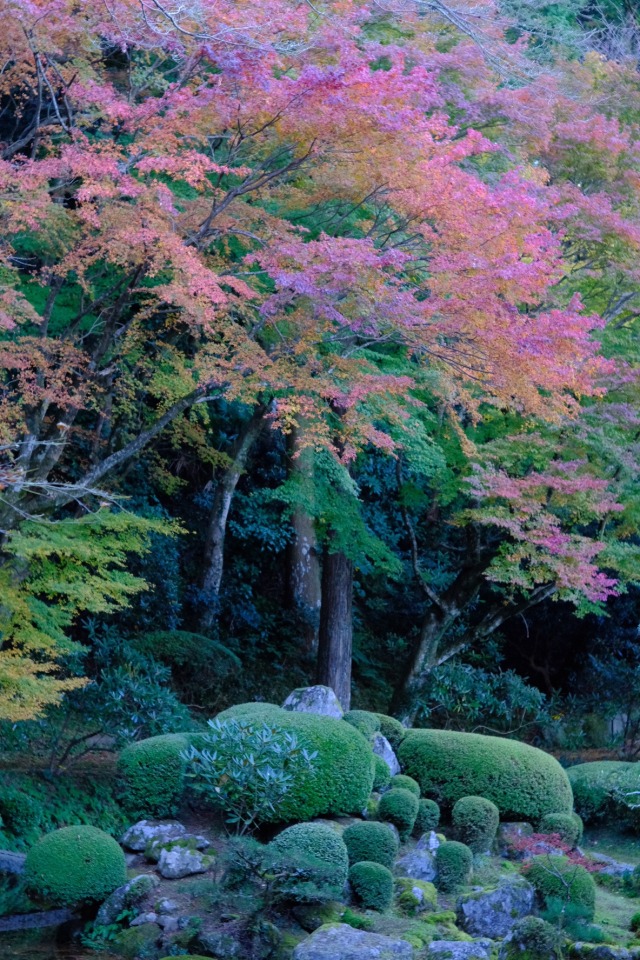
紅葉



津和野cafe 糧



コケ玉
Animal Names in Japanese
Part 3
Fish : 魚 (さかな)
Frog : 蛙 (かえる)
Crow : 烏 (からす)
Owl : 梟 (ふくろう)
Penguin : ペンギン
Snake : 蛇 (へび)
Deer : 鹿 (しか)
Reindeer : トナカイ
Flamingo : フラミンゴ
Pigeon / Dove : 鳩 (はと)
School Pt 1
学校 (がっこう) - school
生徒 (せいと) - student
保育園 (ほいくえん) -Nursery school
幼稚園 (ようちえん) - Kindergarten
小学校 (しょうがっこう) - Elementary/Primary school
小学生 (しょうがくせい) - Elementary/Primary school student
中学校 (ちゅうがっこう) - Junior high school
中学生(ちゅうがくせい) - Junior high school student
高等学校(こうとうがっこう) - the correct name for high school
高校(こうこう)- a shorter version of high school
高校生(こうこうせい) - high school student
大学(だいがく) - University
大学生(だいがくせい) - University Student
専門学校(せんもんがっこう) -Vocational school
専門学校生(せんもんがくせい) - Vocational school student
Animal Names in Japanese
Part 2
Fox:狐 (きつね)
Wolf:狼 (おおかみ)
Bear:熊 (くま)
Lion:ライオン
Tiger:虎 (とら)
Panda:パンダ
Elephant:象 (ぞう)
Giraffe:麒麟 (きりん)
Squirrel/chipmunk:栗鼠 (りす)
Sugar glider:モモンガ
Animal Names in Japanese
Part 1
Animal (s) : 動物(どうぶつ)
Bird : 鳥 (とり)
Cow : 牛(うし)
Horse: 馬(うま)
Dog : 犬(いぬ)
Cat:猫(ねこ)
Pig:豚(ぶた)
Wild Boar:猪(いのしし)
Rabbit:兎(うさぎ)
Mouse:鼠(ねずみ)
Guinea pig:モルモット
The solar system
Japanese/Korean
Space :
宇宙 (uchū) /우주 (wooju)
Alien :
宇宙人 (uchūjin)/외계인 (oegyein)
Planet:
惑星 (wakusei)/행성 (haengseong)
Sun :
太陽 (taiyō)/태양 (taeyang)
Moon:
月 (tsuki)/달 (dal)
Mercury:
水星 (suisei)/수성 (suseong)
Venus:
金星 (kinsei)/금성(geumseong)
Earth:
地球 (chikyū)/지구(jigu)
Mars:
火星 (kasei)/화성(hwaseong)
Jupiter:
木星 (mokusei)/목성(mogseong)
Saturn:
土星 (dosei)/토성(toseong)
Uranus:
天王星 (ten'nōsei)/천왕성(cheonwangseong)
Neptune:
海王星 (kaiōsei)/해왕성(haewangseong)
Pluto:
冥王星 (meiōsei)/명왕성(myeongwangseong)
Star:
星 (hoshi)/별(byeol)
Asteroid:
小惑星(shōwakusei)/소행성(sohaengseong)
Comet:
彗星 (suisei)/혜성(hyeseong)
The Japanese alphabet
(片仮名 / katakana / カタカナ)
ア イ ウ エ オ a i u e o
カ キ ク ケ コ ka ki ku ke ko
サ シ ス セ ソ sa shi su se so
タ チ ツ テ ト ta *chi *tsu te to
ナ ニ ヌ ネ ノ na ni nu ne no
ハ ヒ フ ヘ ホ ha hi *fu he ho
マ ミ ム メ モ ma mi mu me mo
ヤ ユ ヨ ya yu yo
ラ リ ル レ ロ ra ri ru re ro
ワ ヲ wa wo
ン n
+
*ウァ *ウィ *ウェ *ウォ*wa *wi *we *wo
*ヴァ *ヴィ *ヴ *ヴェ *ヴォ *va *vi * v *ve *vo
ガ ギ グ ゲ ゴ ga gi gu ge go
ザ ジ ズ ゼ ゾ za *ji zu ze zo
シャ シュ ショ sha shu sho
ジャ ジュ ジョ ja ju jo
ダ ヂ ヅ デ ド da *ji *zu de do
チャ チュ チョ cha chu cho
バ ビ ブ ベ ボ ba bi bu be bo
パ ピ プ ペ ポ pa pi pu pe po
Country Names in Japanese pt2
USA - アメリカ or 米国(べいこく)
France - フランス
Italy - イタリア
Australia - オーストラリア
Portugal - ポルトガル
Spain - スペイン
New Zealand - ニュージーランド
English words that are used in Japan pt 2
ice cream (アイスクリーム), is also referred to as just `ice` (アイス)
pen (ペン)is also called a ballpen (ボールペン)
chime (チャイム)
drama (ドラマ)
television (テレビジョン), is usually shortened and referred to as `terebi`(テレビ)
English words that are used in Japan
Ball (ボール)
Card (カード)
Service (サービス)
Beach(ビーチ)
File(ファイル)
Salon (サロン)
Country Names EN/JP/KR
Pt1
Country / 国(くに) / 나라
China / 中国(ちゅうごく) /중국
India /インド/ 인도
Indonesia / インドネシア/ 인도네시아
Pakistan / パキスタン/ 파키스탄
Bangladesh / バングラデシュ/방글라데시Japan / 日本(にほん) / 일본
Korea /韓国(かんこく) / 한국
Fruit names in Japanese
Fruit - 果物(くだもの)
1. Apple - 林檎 (りんご)
2. Banana - バナナ
3. Grape - 葡萄 (ぶどう)
4. Peach - 桃 (もも)
5. Watermelon -西瓜 (すいか)
6. Melon -メロン
7. Pear - Japanese pears - 梨(なし)
- 洋梨(ようなし)
8. Orange - オレンジ
9. Mandarin - 蜜柑(みかん)
10. Lemon - 檸檬(れもん)
Movie names (EN / JP)/映画のタイトル(英語 /日本語)

English : Moana (モアナ)
Japanese : モアナと伝説の海
EN trans : Moana and the legend of the sea
モアナ - Moana
と - and
伝説(でんせつ) - legend
の - (particle)
海 (うみ)- sea/ocean

English : Big Hero 6 (ビッグ・ヒーロー・シックス)
Japanese:. ベイマックス
EN Trans: baymax
日本語 :偉大な6人のヒーロー
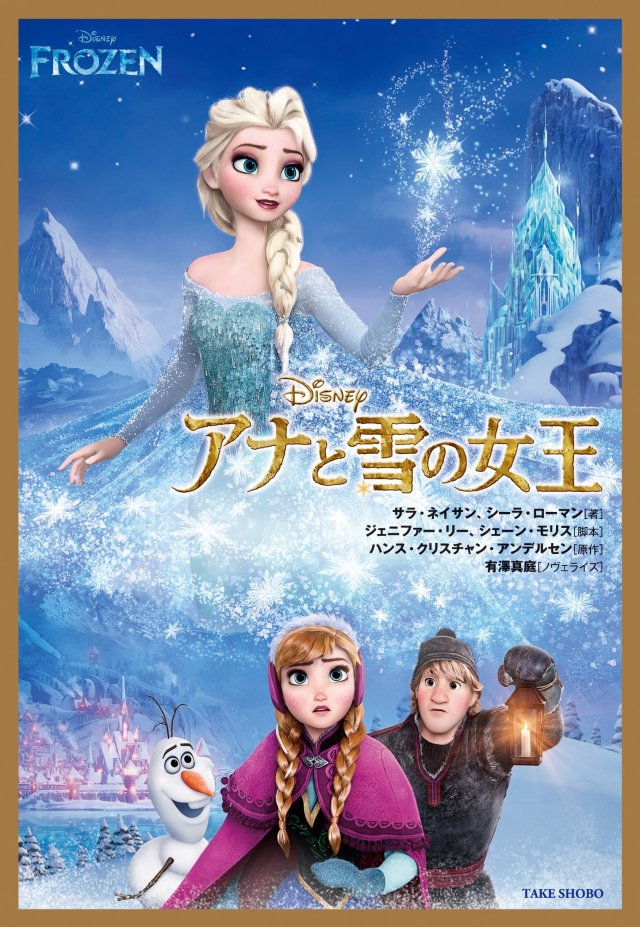
English :Frozen (フローズン)
Japanese: アナと雪の女王
EN trans : Anna and the snow queen
アナ - Anna
と - and
雪(ゆき) - snow
の - (particle)
女王(じょおう) - queen
日本語:凍結

